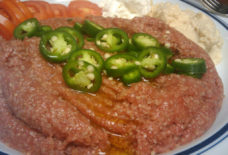New Iraqi eatery turns a darkened past into a bright future
It’s rare in a food review to take on matters much more serious than flavor combinations, beautiful or broken. Here, we talk about food and drink and the enjoyment of it. We don’t tend to delve into the heavy stuff, like prejudice and war.
But heavy stuff underlies the origins of Baghdad Grill, a new Iraqi eatery on North Academy Boulevard. It’s where you should go to experience the simple beauty of cinnamon-laced rice, chicken shawarma spiked with lemon rind, and soft flatbread rubbed with olive oil and zaatar, a lovely spice blend of sumac, sesame seeds, oregano and other herbs.
I first ate that stretchy dough, seasoned in this same fashion and cooked on a large wok placed upside-down over fire embers, as a guest in a Bedouin encampment in the Negev Desert in Israel. I’ve never forgotten it. Like sipping mint tea and smoking a hookah on an Istanbul street, it was one of those rich encounters with Arab culture that hints at the fine culinary and leisure aspects it gifts the world.
Yes, you will find authentic tastes of that culture and cuisine here, via Hasan Algayaar and his two brothers, sister and mother, plus Iraqi friends who linger over Middle Eastern black tea blends served on decorative silver platters with ornate glassware, teaspoons and a necessary sugar caddy.
But notice the missing father figure. In seeking to learn how the Algayaars have come to America, and if they were affected by the prolonged Iraq war, I ask as politely as possible where he is. And apologies if I mistake any of these details due to a slight language barrier, but Hasan, flanked by both his brothers at the cash register — similar smiles, noses and sharp eyes punctuating their handsome, dark features — starts with a pregnant pause and slight voice crack.
The family was affluent, he says, owning a clothing-manufacturing business that employed more than 300. But a wave of sectarian violence in 2006 fueled by al-Qaeda in Iraq saw Sunni insurgent groups lash out at Shiites — the Algayaars’ branch of Islam. All Hasan shares is that during the infighting, his family’s home and business were burned and his father, who had worked with the U.S. Army in some capacity, was killed.
Refugee status led to emigration, and the family’s now been here five years. They drive to Denver four times a week to buy Halal meat, slaughtered and blessed specifically to Islamic custom. They lengthily marinate then grill or rotisserie-roast the beef, chicken and lamb for gyros and larger platters. Those get house-baked breads, a great chickpea-dominant hummus, or fluffy, hush-puppy-like falafel rounds. Pizzas are simple with a nice, airy dough; ours was a little underdone.
Also in Denver, import markets provide pre-packaged Arabic seasonings like a shawarma mix of black pepper, cloves, cardamom, ginger, nutmeg, coriander, cinnamon, white pepper and dry lemon — all faintly detectable in the finished product. It comes off similar to other Middle Eastern food with which you’re familiar, but with slight deviations.
The clean dining room, meanwhile, represents a pronounced departure from most strip-mall fare, decorated with bright art over red walls and finely upholstered booths. Menus are on flat-screens above the order counter, and Middle Eastern music plays quietly. Authenticity and sincerity are undoubtable.
Life would not have gone this way for the Algayaars in a better world. But like the fruit juices they offer with dinner, Baghdad Grill makes for a sweet new beginning.
Source: www.csindy.com


